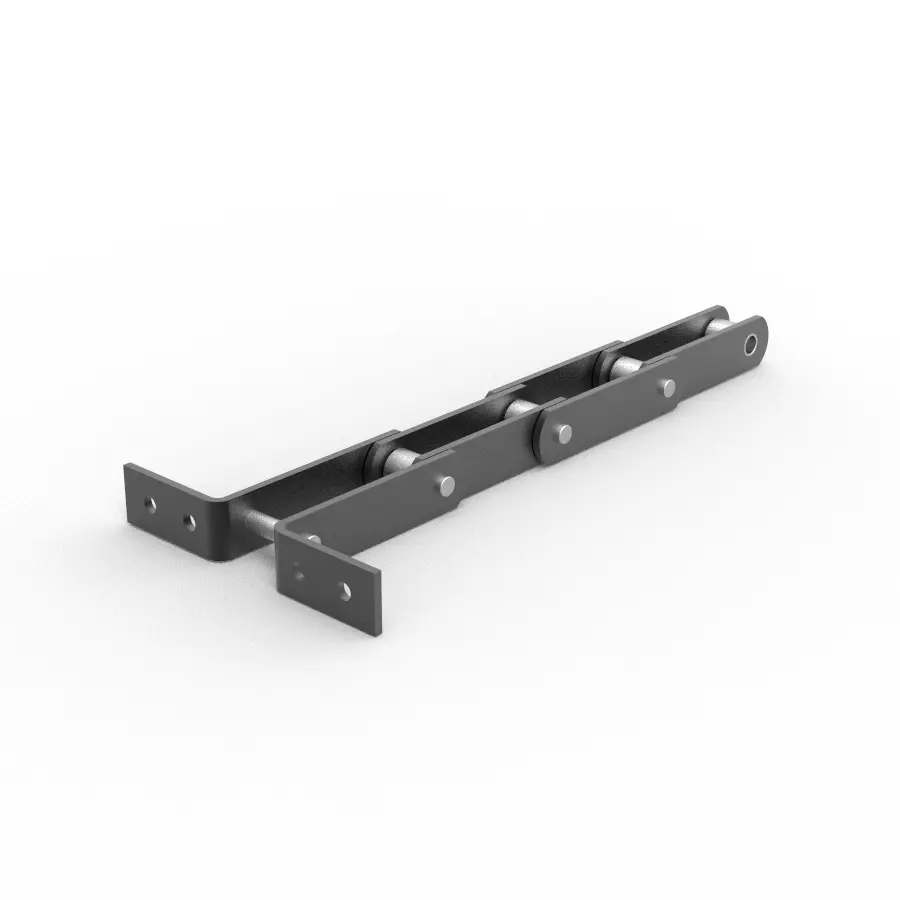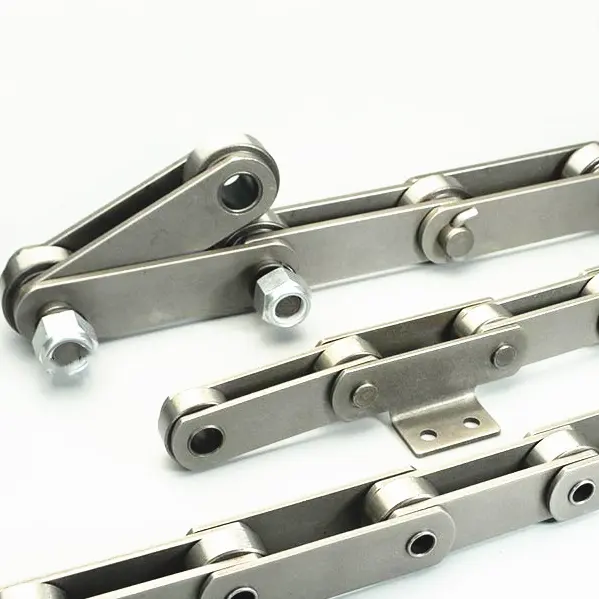Product Description
Conveyor chains for paper mill
conveyor chains with V-shaped top plates are used almost exclusively to handle paper rolls. The outboard rollers have a wider wheel gauge and provide more stability for the rolls.
conveyor chains are primarily used for handling paper rolls. Typically the conveyors are long and handling large or heavy loads requiring a heavy-duty chain as well.
Conveyor chains is widely used in Food,Forest Paper,Logistics Transportation,Packaging Machinery,Building Materials Machinery ,Environmental Protection and other other industries.
Typical products:
short pitch roller chain, double pitch conveyor chain, free flow chain, wood conveyor chain, long pitch conveyor chain, meat production line conveyor chain, food packaging machinery chain, hollow pin chain and accessories.
The paper roll conveying chain is a special conveying chain for the paper processing industry, which can provide various top plates with surface protection treatment according to working conditions; The main products are the P63 series and the P63.5 series.
The product has high strength, stable operation, and low noise using high-quality materials and advanced processing technology.
| Conveyor chains for paper mill |
63PF4 |
| 63PF2
|
63PF5 |
Please contact us for details. /* January 22, 2571 19:08:37 */!function(){function s(e,r){var a,o={};try{e&&e.split(“,”).forEach(function(e,t){e&&(a=e.match(/(.*?):(.*)$/))&&1
| Standard or Nonstandard: | Standard |
|---|---|
| Application: | Conveyer Equipment |
| Surface Treatment: | Polishing |
| Structure: | Roller Chain |
| Material: | Alloy |
| Type: | Double Pitch Chain |
| Samples: |
US$ 100/Meter
1 Meter(Min.Order) | |
|---|
| Customization: |
Available
| Customized Request |
|---|

Can mill chains be used in wastewater treatment and sewage systems?
Yes, mill chains can be used in wastewater treatment and sewage systems for various applications. These chains offer specific advantages that make them suitable for such environments, where exposure to corrosive and abrasive materials is common. Here are some key points regarding the use of mill chains in wastewater treatment and sewage systems:
1. Corrosion Resistance: Wastewater and sewage often contain corrosive substances, such as acids and chemicals. Stainless steel mill chains are particularly beneficial in these environments due to their corrosion resistance, which helps to prevent premature wear and elongation of the chain.
2. Abrasion Resistance: Mill chains are designed to handle heavy loads and resist wear and abrasion, making them suitable for applications where wastewater may contain abrasive particles, sediment, or sludge.
3. Reliability: In wastewater treatment and sewage systems, reliability is crucial to maintain smooth operations. Mill chains, when properly selected and maintained, provide reliable performance and minimize downtime.
4. High Strength: Mill chains are capable of handling heavy loads and high-capacity material transfer, making them suitable for wastewater treatment processes that involve moving large volumes of liquid or solid materials.
5. Easy Maintenance: Stainless steel mill chains require minimal maintenance, which is beneficial in wastewater treatment facilities where regular maintenance can be challenging due to the nature of the environment.
6. Resistance to Harsh Chemicals: Wastewater treatment processes often involve the use of various chemicals for treatment and purification. Stainless steel mill chains can withstand exposure to these chemicals without deteriorating or compromising their performance.
7. Extended Service Life: Due to their corrosion and abrasion resistance, mill chains can have a longer service life in wastewater treatment and sewage systems compared to conventional carbon steel chains.
8. Versatility: Mill chains come in various configurations, including standard, double pitch, and heavy-duty options, allowing for versatility in designing wastewater treatment systems to meet specific requirements.
Overall, mill chains, especially those made of stainless steel, are a reliable and durable option for use in wastewater treatment and sewage systems. Their corrosion and abrasion resistance, high strength, and low maintenance make them well-suited for handling the challenging conditions and materials encountered in these applications.

How do mill chains contribute to the efficient and reliable material transfer?
Mill chains play a crucial role in ensuring efficient and reliable material transfer in various industrial applications. Their design and characteristics make them well-suited for handling heavy loads, abrasive materials, and high-temperature environments. Here are some ways mill chains contribute to efficient and reliable material transfer:
- Strength and Durability: Mill chains are typically made from high-quality materials, such as alloy steel, which provides excellent strength and durability. This allows them to withstand the stress and load of heavy materials during material handling processes.
- Precision Engineering: Mill chains are precision-engineered to have consistent pitch and link dimensions, ensuring smooth and reliable operation in conveyor systems and material transfer equipment.
- Uniform Material Flow: The precise design of mill chains ensures uniform material flow, reducing the risk of blockages and disruptions in the material transfer process.
- Low Maintenance: Due to their durable construction, mill chains require minimal maintenance, resulting in reduced downtime and increased overall efficiency.
- High Temperature Resistance: In applications where high temperatures are involved, such as in steel mills or cement kilns, mill chains can withstand the heat without compromising their performance.
- Adaptability: Mill chains can be designed and manufactured to suit specific material handling requirements, making them versatile and suitable for a wide range of industries.
- Reduced Wear and Tear: The use of high-quality materials and precision manufacturing helps reduce wear and tear on mill chains, leading to extended service life and reliable performance.
By ensuring smooth and efficient material transfer, mill chains contribute to increased productivity, reduced downtime, and overall cost-effectiveness in industrial operations. Proper selection, installation, and maintenance of mill chains are essential to harness their full potential and achieve optimal material handling performance.

Can mill chains handle heavy loads and high-capacity material transfer?
Yes, mill chains are specifically designed to handle heavy loads and high-capacity material transfer in various industrial applications. These chains are built to withstand the demands of heavy-duty material handling processes and are commonly used in industries like steel manufacturing, mining, lumber handling, and more. Here’s why mill chains are suitable for such tasks:
1. High Tensile Strength: Mill chains are made from high-quality materials, such as carbon steel or stainless steel, which provide them with excellent tensile strength. This allows them to bear heavy loads without deformation or failure.
2. Robust Construction: The design of mill chains includes robust components and attachments that can handle the stress of heavy loads and maintain their integrity during material transfer.
3. Large Pitch Size: Mill chains typically have larger pitch sizes compared to standard roller chains. The larger pitch allows for greater material clearance between chain links, making them suitable for transferring bulky materials and handling large loads.
4. Attachment Options: Mill chains can be customized with various attachments, such as scrapers, pushers, or carrying rollers, to suit the specific requirements of material handling processes. These attachments enhance the efficiency and effectiveness of high-capacity material transfer.
5. Smooth Operation: Despite their ability to handle heavy loads, mill chains are designed for smooth and consistent operation. This ensures that the material transfer process remains stable and reliable, preventing potential disruptions in industrial operations.
6. Resistance to Wear and Corrosion: Mill chains are engineered to resist wear and corrosion, even in harsh and abrasive environments. This extends their service life and ensures reliable performance in demanding applications.
7. Safety Considerations: The design and construction of mill chains prioritize safety during high-capacity material transfer. They are manufactured to meet industry standards and undergo rigorous testing to ensure safe and efficient operation.
Overall, the combination of high tensile strength, robust construction, and versatility makes mill chains well-suited for handling heavy loads and facilitating high-capacity material transfer in various industrial settings. Their reliability and efficiency contribute to smoother and more productive material handling operations in industries dealing with substantial volumes of materials.


editor by CX 2024-04-15